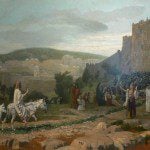I was gratified because I also am afraid whenever words are answered by violence; we who live by words are always vulnerable to those who have the power of the sword.
I was embarrassed, however, because in the process of defending the freedom of the press, most failed to notice that Rushdie was an unworthy champion -- that defending Rushdie's freedom of the press should have been just as unpleasant to people of good will as defending, say, Larry Flynt's freedom to publish pornography.
Just because Khomeini behaved in a very bad way toward Rushdie did not make Rushdie one of the good guys. Quite the contrary. Rushdie is a bad guy in this story, and we defend him only because of the inappropriateness of the Ayatollah's response, not because what Rushdie did was good or even innocuous.
Assault on Faith
Satanic Verses is a despicable book that could not have been written by a person who wished to behave decently and responsibly. The book is clearly aimed at Muslim readers; it is hard to imagine a non-Muslim reading it with anything more than mild curiosity. Yet Rushdie, as a lapsed Muslim, also knew that the Muslim audience would be outraged by it. He could only have written it as a calculated offense against his own community.
The most dangerous aspect of the literary world's knee-jerk defense of Satanic Verses was the widespread assumption that because the book was fiction, it was absurd for anyone to be so angry at it. Especially galling was this frequent bit of illogic: "How dare these people get upset about Satanic Verses when they haven't even read it!" This makes as much sense as saying, "How dare these people get upset about drunk drivers when they've never been run over by one."
Storytelling does not operate in a vacuum.It fulfills a vital human need -- that's why there's no human society without it and precious little human contact that does not take the form of storytelling. We can hardly get through the day without many stories of many kinds. And fiction is one of the most powerful kinds. Unlike "true" stories (history, science, news, gossip), fiction is not subject to immediate revision upon discovery of a new fact. The author of a fictional tale has absolute authority, within the world of the story, over the most fundamental area of human thought: causality, why things happen.
What happens in fiction resonates or clashes with the deepest parts of our identity: our sense of how the world works, of what it means to be human, and of who, as individuals and members of a community, we are. When we read fiction we either reaffirm or redefine our conception of reality to a degree surpassed by only one other type of story: religious revelation. And when fiction moves into a realm of mind where revelation holds sway, it will be the profoundest challenge to -- or affirmation of -- faith.
Muslims' very existence as a people depends on the holiness of Mohammed and the validity of his revelation from God. Their understanding of the way the world works depends on this. When Rushdie treated Mohammed with scorn and depicted him in a vulgar, low way, he challenged the foundation of their collective and individual identities. He tore at the very heart of who they are.
Satanic Verses is not "pure" artistic expression. (There is no such thing, anyway.) It was anti-Islamic literature -- a story by a former insider who deliberately struck at the very heart of the Islamic faith.
Anti-Mormon Literature
I remember my first exposure to hardcore anti-Mormon literature. I was in Brazil on my mission when a member brought us some pamphlets that a friend of his had been given. (You know the pattern -- nobody talks to the guy about religion in his whole life, but the minute they find out he's attending Mormon meetings, they have all kinds of "information" about the Mormons.)
As I read the pamphlets, I never felt my faith challenged -- I never was tempted to doubt. It was all silly stuff that I'd heard about before. But I found myself getting deeply angry because I imagined other people reading this stuff and thinking it was true. I wanted to go out and find every copy of those pamphlets and include with each one my own detailed refutation of every lie they told.
Yet that was impossible. So I found myself filled with helpless, impotent rage at how these people were creating a false image of Mormonism. They were defining for many people what the name Mormon stands for; they were defining the most powerful of the communities that comprise my identity; therefore they were defining me. I seethed for days, even after I carefully and patiently answered the questions these pamphlets had raised in the minds of the members and nonmembers I knew who had read them. It still hurts to remember -- for even though my faith is unchallenged by them, my public identity is profoundly challenged.




